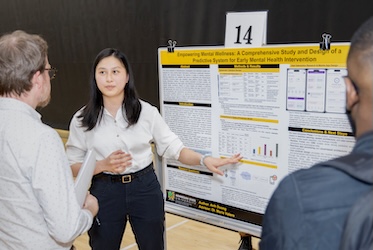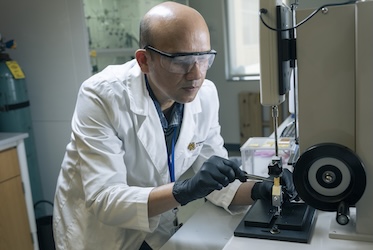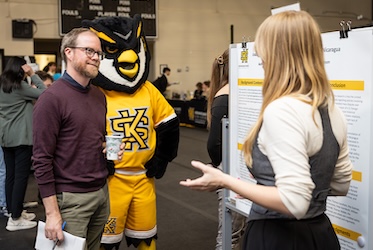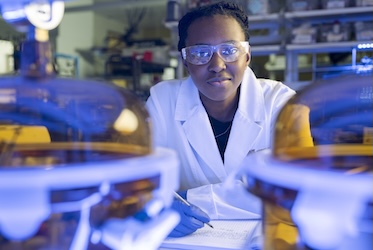
Researcher to discuss properties of plant growth
KENNESAW, Ga. | Dec 2, 2020
Kennesaw State University’s Office of Research is hosting a one-hour web show every other Friday at 4 p.m. to showcase the varied research being conducted by KSU faculty members. “Research with Relevance” spotlights Kennesaw State researchers in a live interview followed by an interactive question-and-answer session with the virtual audience.
In this week’s episode, Mario Bretfeld, assistant professor of biology in the College of Science and Mathematics, will discuss his research on the thermo-biological properties of organic and conventional tomatoes grown at the KSU Field Station. Before the presentation, Bretfeld answered a few questions about his interest in research and the ways in which he involves students.

How did you first get involved in this field of research?
I’ve always been a nature enthusiast. There are some old notes describing the life cycle of butterflies somewhere in my parents’ attic from when I was about 10 years old. After some career detours, I finally settled on studying landscape ecology, which set the foundation to my academic career in biology.
Who has influenced you, either as an instructor or as a researcher?
Of course many people influenced me throughout my career. Perhaps most pivotal in recent years was working with Dr. Brent Ewers from the University of Wyoming, which shifted my approach to research and teaching toward emphasizing first principles.
What was the defining (or ‘aha”) moment when you realized this is what you wanted to do?
If I had to name one moment that reinforced me in my decision to pursue this career, it would be a backcountry field trip in Yellowstone National Park in 2009. Camping in undisturbed nature under the stars all but cemented my desire to understand and help protect the natural environment.
In what ways has KSU supported your research?
Besides support from my amazing colleagues in the Ecology, Evolution, and Organismal Biology department, I’ve been fortunate to collaborate across departments and receive some internal funding to help with pilot studies. Most importantly, the KSU Field Station and its staff have been critical in establishing my research here at KSU and were a major factor in my decision to join the KSU family.
How are you involving students in your research? How have you seen students benefit from being involved in your research efforts?
I am a strong advocate for the CURE (Course-based Undergraduate Research Experience) approach to teaching labs. Our current project on thermo-biological properties of tomatoes at the KSU Field Station integrates students from two biology courses. In fact, the students collect data not only for the sake of learning the methodology and scientific method, but their data (and analyses) will actually inform real science!
What do you hope students learn from you in the classroom?
I want my students to gain a mechanistic understanding of biological processes, rather than memorizing them. Nowadays, your smart device enables you to find the answer to the formula for photosynthesis anytime and anywhere. However, understanding (and most importantly predicting) how this process is affected by changes in temperature or atmospheric carbon concentrations requires a deeper understanding of the underlying mechanisms of photosynthesis.
What is a common misconception about your field?
Besides being frequently asked which trees to plant in their backyard (to which I hardly ever know the answer), many plant ecophysiologists (including me) lack a green thumb. However, we are really good at watching and making plants suffer in order to better understand how they function.
How much has your field changed in the time you’ve studied it?
Recent technological advances, both in terms of hardware and software, have enabled us to create and test increasingly complex models of ecosystem processes, such as carbon sequestration and water cycling. In fact, an abundance of complex ecosystem and process-based models now has modelers begging for more field data to test them. This is exciting because I truly love field work.
Related Stories

Passions spark innovation at Kennesaw State Symposium of Student Scholars

Kennesaw State researcher tackling sustainability through use of transparent wood

Kennesaw State students to present research at Symposium of Student Scholars

Chemistry student engaged in sustainable catalyst research through Kennesaw State's First-Year Scholars program
A leader in innovative teaching and learning, Kennesaw State University offers undergraduate, graduate, and doctoral degrees to its more than 47,000 students. Kennesaw State is a member of the University System of Georgia with 11 academic colleges. The university’s vibrant campus culture, diverse population, strong global ties, and entrepreneurial spirit draw students from throughout the country and the world. Kennesaw State is a Carnegie-designated doctoral research institution (R2), placing it among an elite group of only 8 percent of U.S. colleges and universities with an R1 or R2 status. For more information, visit kennesaw.edu.















